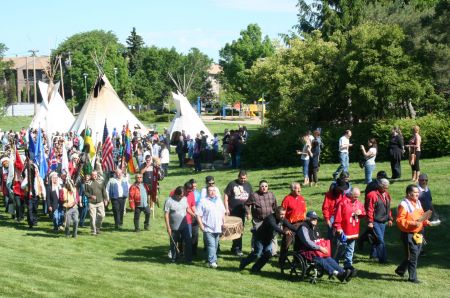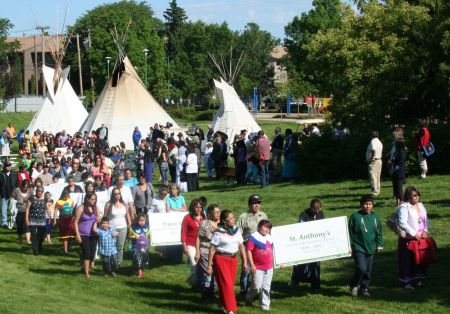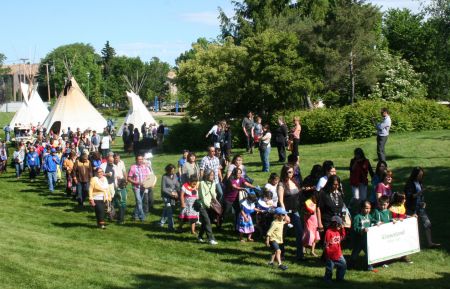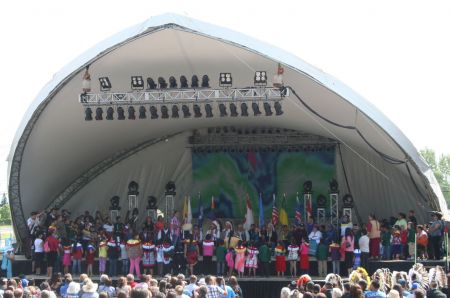STORY about IndigenousPolice/Prisonspublié le Juin 21, 2012 by SandraCuffe
Residential School Survivors Gather in Saskatoon
Former Students Walk to First Day of TRC National Event

The Indian Residential School Survivor Walk arrived at the Truth and Reconciliation Commission national event in Saskatoon after walking 138km from St. Michael's residential school in Duck Lake, SK. Photo: Sandra Cuffe

People attending the TRC national event gathered outside to welcome the Indian Residential School Survivor Walk. Photo: Sandra Cuffe

After lighting the sacred fire that will burn throughout the TRC national event in Saskatoon, residential school survivors, their families, the Commissioners and others walked to the opening ceremonies. Photo: Sandra Cuffe

Children carried banners with the names of the residential schools in Saskatchewan. Photo: Sandra Cuffe

There are over 21,000 First Nations residential school survivors living in Saskatchewan, according to the Federation of Saskatchewan Indian Nations. Photo: Sandra Cuffe

A children's singing group performed at the opening ceremonies of the Truth and Reconciliation Commission national event in Saskatoon. Photo: Sandra Cuffe
Also posted by SandraCuffe:
Also in Police/Prisons:
Note: This article may be triggering. For immediate emotional support, the 24-hour Indian Residential Schools Crisis Line is available toll-free at 1-866-925-4419.
SASKATOON - An eagle circled overhead as the Indian Residential School Survivor Walk participants arrived at the Truth and Reconciliation Commission national event in Saskatoon this morning. As they arrived, walkers gathered around the sacred fire that will burn in Exhibition Park throughout the four-day event.
Led by residential school survivor and former NHL player Fred Sasakamoose, dozens of walkers of all ages began their trek on June 18th at St. Michael's residential school in Duck Lake, Saskatchewan. They joined hundreds of others already in attendance at Prairieland Park after the opening ceremonies for the event. More participants are expected tomorrow and this weekend, when those affected by the legacy of the residential school system will share their experiences with the Commission.
Now 78, Fred Sasakamoose was accompanied on the walk from his former school to Saskatoon by members of his family including grandchildren, together with many others.
"We covered 138 kilometers in three and a half days," he said when people around the fire pointed out the eagle overhead. "All through our journey it was with us."
Sasakamoose gave a statement about the childhood years he spent against his will at St. Michaels earlier this year, at one of the Commission's regional hearings leading up to the national event. After living his early years with his family on the Sandy Lake reserve, he was taken at age six to the Catholic-run school. There, he was told not to speak Cree - his only language.
I am hurt, Sasakamoose told the Commission in February. After witnessing the rape of some of the younger children by older students, he too was raped.
He was nine years old at the time.
After telling his story and then walking from the site of his childhood trauma to the fire at the national event, Sasakamoose turned to the three Commissioners this morning and told them that he had no more hurt.
Eugene Arcand, a member of the Commission's Survivor Committee, also attended St. Michael's. He walked over to the fire to welcome Sasakamoose and the walkers after speaking at the opening ceremonies for the national event.
"This is a once-in-a-lifetime opportunity," Arcand told those present in Saskatoon, urging everyone to encourage all Saskatchewan survivors and their families to attend. "This is never going to happen again."
Arcand has carried a photograph of his residential school class with him to each Truth and Reconciliation Commission national event. He recognized some schoolmates amid the crowd, he said. But across the country the numbers of survivors still living are in decline.
"There's a story in every residential school survivor," said elder and fellow Survivor Committee member Barney Williams Jr at the opening ceremonies. "Those stories need to be heard."
Saskatchewan in particular has a high ratio of residential school survivors, said Chair of the Commission Justice Murray Sinclair. About 30,000 people from the province have filed claims under the Indian Residential Schools Settlement Agreement, he said. Saskatchewan has a First Nations population of approximately 138,000 and a Métis population of more than 100,000.
The Truth and Reconciliation Commission was created as part of the Indian Residential Schools Settlement Agreement, the result of the largest class-action lawsuit in the history of Canada. Because the agreement cut short some of the court cases that would have allowed survivors to take the stand, many wanted an opportunity to put on the record the full and true story, said Justice Sinclair, "to ensure that there is a national memory created around residential schools."
One of the mechanisms for the education and engagement of the broader public in Canada is the series of national events. Established by the Settlement Agreement, the Commission's mandate includes the funding and hosting of seven national events in different parts of the country.
Statement-gathering and outreach activities are ongoing at the individual, community and regional levels, but the national event in Saskatoon is only the fourth of its kind. Over the past two years, national events have been held in Winnipeg, home to the Commission's main office, Inuvik and Halifax. Along with future events in Alberta and Quebec, a national event will be held in Vancouver from September 18 to 21, 2013.
In Saskatoon, residential school survivors and their descendants, inter-generational survivors, will give their statements to the Commission in formal Commissioner Sharing Panels, Survivors Sharing Circles, and private statement-gathering sessions. Former staff, management and other residential school employees are also urged to give statements about their experiences.
The national event at Prairieland Park will be in full swing tomorrow, with a program packed with survivor statements, gatherings, education, and music. Although there are many concurrent sessions in different areas, some will be featured on a live feed webcast on the Commission's website. Across the street, the sacred fire will continue to burn over the next three days.
Sandra Cuffe is a Vancouver-based journalist and is currently in Saskatoon, covering the national event. This article is the second in a series funded and published by the Vancouver Media Co-op about the TRC and the residential school system and legacy. The first, A Sad Chapter in Our History?, was published on June 11th, and more will follow both during and after the national event in Saskatoon.
- Vous devez vous identifier ou créer un compte pour écrire des commentaires
The site for the Vancouver local of The Media Co-op has been archived and will no longer be updated. Please visit the main Media Co-op website to learn more about the organization.
Commentaires
"The Indian Residential
"The Indian Residential Schools Truth and Reconciliation Commission is a hoax contrived by the legal establishment to evade culpability..."
from
A Critique of the Indian Residential Schools Truth and Reconciliation Commission
by Bruce Clark
http://dissidentvoice.org/2008/11/a-critique-of-the-indian-residential-s...
Thanks for the comment! I
Thanks for the comment!
I think it's worth pointing out that the critique was written *before* the current Commissioners began their work.
Also, read today, parts of it are quite misleading. Residential school survivors and others affected by the residential school system are encouraged to name perpetrators in individual statement-gathering sessions. One reason that people are advised not to name *living* individuals if they have not already been tried and convicted is that future criminal and/or civil cases by survivors against those perpetrators may be compromised.
Perhaps the critique that "[in] consequence of these limitations, the commission can not expose wrongdoings of the government" was a valid concern at the time of its establishment. Any peek at the Commission's activities, reports, findings, etc today would show that concern to have fortunately been assuaged.
I'm not suggesting that critiques of the TRC are not valid. But I think it would be fantastic if people would take a minute to see what's actually going on now and articulate critiques based on the TRC's actual work, as opposed to limiting their reading or perspective to critiques developed before the TRC's work began.
This one, for example, looks interesting: http://briarpatchmagazine.com/articles/view/re-envisioning-reconciliation
Thanks for your comment! The above comments are not directed at you or anyone in particular. I've just seen other critiques from 2008 circulated and hope that there will be more up-to-date discussion and critique taking the past few years into consideration...
~ sandra
Thanks for Clarifications
Will look forward to hearing that the Canadian criminals responsible for this indigenous holocaust, those remaining, are to be charged and held accountable. Thanks for the interesting link as well. Here's more:
The Circle Game: Shadow and Substance in the Residential School Experience in Canada
http://www.nativestudies.org/native_pdf/circlegame.pdf
'Sorry' For Genocide
http://www.dominionpaper.ca/articles/1928
& more...
Nice, thanks. I have put a hold on The Circle Game at my local library - they're getting the new edition in... Here are a couple more that I'm looking forward to:
Dancing on Our Turtle’s Back, by Leanne Simpson (link = review)
& I just started reading Unsettling the Settler Within: Indian Residential Schools, Truth Telling, and Reconciliation in Canada, by Paulette Regan (link = PDF of the first ~40 pages)
Quite a few CCNA Testking
Quite a few CCNA Testking 640-553 instruction companies rely on a couple instruction techniques just. A few colleges work with bookwork on it's own, although some may well work with simulators that can help Testking N10-004 college students understand. However people may well combine bookwork and also simulations.
Overwhelming.
I met an elder who went to residential school for ten years.
The elder didn't apply for residential school money,
because it is to overwhelming to discuss.
Hi, it's very great
Hi,
it's very great informative stuff shared here useful one for many others who needs this kind of stuff, I truly appreciate this. Thanks -get more soundcloud plays